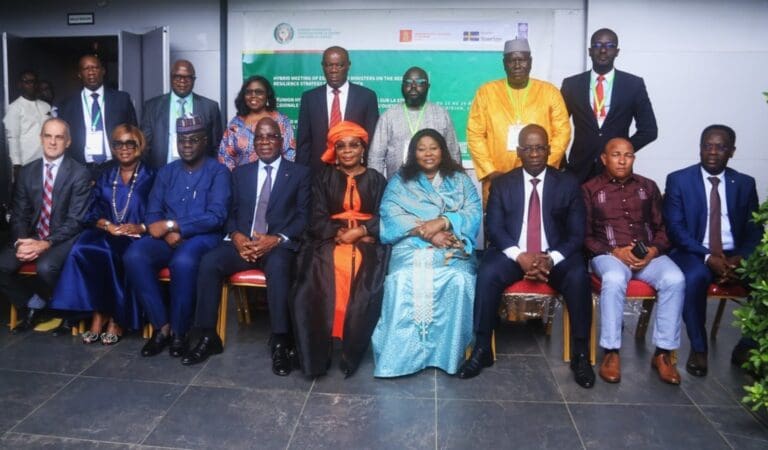The Economic Community of West African States (ECOWAS) launched on Thursday, November 28, 2024, in Abidjan, a comprehensive initiative to develop a regional resilience strategy in response to challenges, such as environmental degradation.
West Africa is home to a mosaic of resilient cultures and communities, yet it faces crises such as climate disasters, rapid and unplanned urbanization, and chronic humanitarian challenges.
According to Fatou Sarr, ECOWAS Commissioner for Human Development and Social Affairs, representing the President of the ECOWAS Commission, Dr. Omar Touray, “these problems have plunged millions of our fellow citizens into poverty, food insecurity and forced displacement.”
For four days, from 25 to 29 November 2024, experts and ministers from the sub-region, meeting on the shores of the Ebria Lagoon, focused on these various crises in order to adopt a regional resilience strategy, under the auspices of the ECOWAS Commission.
Fatou Sarr also noted that the long-term effects of the Covid-19 pandemic, the Russian-Ukrainian conflict and global economic instability have further exacerbated these problems, thus compromising the Sustainable Development Goals.
This, she will argues, shows “the urgent need to develop a bold regional strategy that focuses on the vulnerable groups that are women, girls and children,” in a context of a generalized economic crisis.
This strategy was developed around six themes, namely good governance, peace and security; macroeconomic resilience, sustainable livelihoods, social protection, gender sensitivity and social inclusion and climate change.
For Fatou Sarr, these points were “carefully selected to address the root causes of vulnerability, to promote sustainable development in the region and to reflect on innovative solutions to be implemented at regional and national levels to address the challenges.
“The strategy provides a coherent framework and serves as a tool to highlight the overall ambitions of the region for the period 2024-2050 in line with ECOWAS Vision 2050,” ECOWAS Commissioner, Dr. Fatou Sarr added.
She emphasized the importance of establishing streamlined coordination. To achieve this, ECOWAS has committed to developing an operational plan for regional coordination that translates into the establishment of relevant institutional mechanisms and support to Member States.
Gael Olivier, Deputy Resident Representative of the United Nations Development Programme (UNDP), ECOWAS partner, sees this strategy as a collective call to build a safer, more inclusive and more sustainable future for every community in the region.
“By integrating climate issues into development plans at all levels, we want to transform constraints into sustainable opportunities. We are also investing in resilient livelihoods to enable communities not only to adapt to climate challenges, but also to prosper in harmony with their environment,” he said.
The Ivorian Minister of Environment, Sustainable Development and Ecological Transition, Jacques Assahore, welcomed this initiative and insisted on the participation of local communities in the development and implementation of this strategy.
“Women, youth, children and marginalized populations must occupy a central place in our reflections and actions, because they are the first affected by crises,” said the Ivorian Minister of Ecological Transition.
AP/fss/gik/APA


